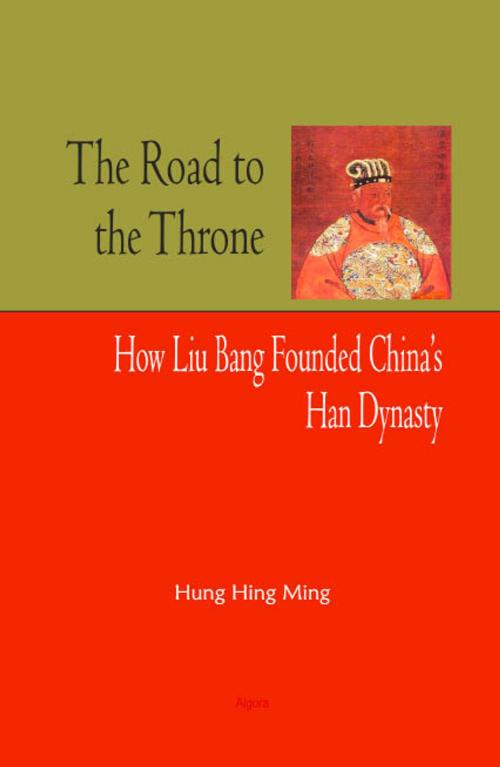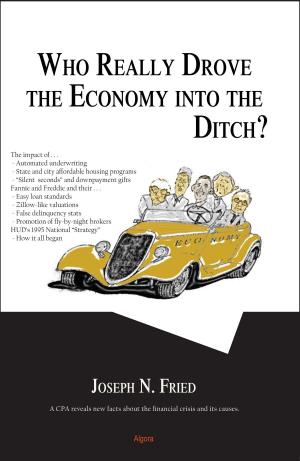| Author: | Hing Ming Hung | ISBN: | 9780875868394 |
| Publisher: | Algora Publishing | Publication: | December 15, 2009 |
| Imprint: | Algora Publishing | Language: | English |
| Author: | Hing Ming Hung |
| ISBN: | 9780875868394 |
| Publisher: | Algora Publishing |
| Publication: | December 15, 2009 |
| Imprint: | Algora Publishing |
| Language: | English |
Liu Bang (256 BC‒195 BC), posthumously called Emperor Gaozu, was a low-ranking functionary in an obscure corner of the realm when he caught the wave of the great uprisings against the Qin Dynasty. First as leader of a local contingent and then as general of larger and larger armies, he eventually overthrew the despotic Qin emperor. Today, the Han are the majority ethnic identity in China.
This is the story of the rise of Emperor Gaozu, his alliances and his rivalries, and the priceless partnership provided by his chief military strategist Zhang Liang, who planned victorious campaigns from 1000 miles distance; Xiao He, who stabilized the state, pacified the people, and assured the food supply to the army; and General Han Xin, who commanded the Han army in its conquest of the State of Wei, the State of Zhao, the State of Yan and the State of Qi and played a great role in the defeat of Xiang Yu.
Most of the material used in writing The Road to the Throne are taken from the Records of the Grand Historian (Chinese: 史記 or shiji) by the great Sima Qian (145 BC85 BC) of the Early Han Dynasty, which is not only a great work of history but also a great work of literature.
Interwoven into the chronological narrative of battles fought and alliances forged, forced, or flouted, we find edifying examples of good leadership versus bad, hot-headed fighters versus disciplined warriors who bide their time and win the day, and lessons on how to test and win peoples loyalty, and how to prevail under the most disadvantageous conditions. In an era we may think was run by sheer force and autocratic rule, the greatest achievements are credited to the person who accepts advice, who rewards wise subordinates, and who shares the spoils rather than playing winner-takes-all.
This is the story of the rise of Emperor Gaozu, his alliances and his rivalries, and the priceless partnership provided by his chief military strategist Zhang Liang, who planned victorious campaigns from 1000 miles distance; Xiao He, who stabilized the state, pacified the people, and assured the food supply to the army; and General Han Xin, who commanded the Han army in its conquest of the State of Wei, the State of Zhao, the State of Yan and the State of Qi and played a great role in the defeat of Xiang Yu.
Most of the material used in writing The Road to the Throne are taken from the Records of the Grand Historian (Chinese: 史記 or shiji) by the great Sima Qian (145 BC85 BC) of the Early Han Dynasty, which is not only a great work of history but also a great work of literature.
Interwoven into the chronological narrative of battles fought and alliances forged, forced, or flouted, we find edifying examples of good leadership versus bad, hot-headed fighters versus disciplined warriors who bide their time and win the day, and lessons on how to test and win peoples loyalty, and how to prevail under the most disadvantageous conditions. In an era we may think was run by sheer force and autocratic rule, the greatest achievements are credited to the person who accepts advice, who rewards wise subordinates, and who shares the spoils rather than playing winner-takes-all.
Liu Bang (256 BC‒195 BC), posthumously called Emperor Gaozu, was a low-ranking functionary in an obscure corner of the realm when he caught the wave of the great uprisings against the Qin Dynasty. First as leader of a local contingent and then as general of larger and larger armies, he eventually overthrew the despotic Qin emperor. Today, the Han are the majority ethnic identity in China.
This is the story of the rise of Emperor Gaozu, his alliances and his rivalries, and the priceless partnership provided by his chief military strategist Zhang Liang, who planned victorious campaigns from 1000 miles distance; Xiao He, who stabilized the state, pacified the people, and assured the food supply to the army; and General Han Xin, who commanded the Han army in its conquest of the State of Wei, the State of Zhao, the State of Yan and the State of Qi and played a great role in the defeat of Xiang Yu.
Most of the material used in writing The Road to the Throne are taken from the Records of the Grand Historian (Chinese: 史記 or shiji) by the great Sima Qian (145 BC85 BC) of the Early Han Dynasty, which is not only a great work of history but also a great work of literature.
Interwoven into the chronological narrative of battles fought and alliances forged, forced, or flouted, we find edifying examples of good leadership versus bad, hot-headed fighters versus disciplined warriors who bide their time and win the day, and lessons on how to test and win peoples loyalty, and how to prevail under the most disadvantageous conditions. In an era we may think was run by sheer force and autocratic rule, the greatest achievements are credited to the person who accepts advice, who rewards wise subordinates, and who shares the spoils rather than playing winner-takes-all.
This is the story of the rise of Emperor Gaozu, his alliances and his rivalries, and the priceless partnership provided by his chief military strategist Zhang Liang, who planned victorious campaigns from 1000 miles distance; Xiao He, who stabilized the state, pacified the people, and assured the food supply to the army; and General Han Xin, who commanded the Han army in its conquest of the State of Wei, the State of Zhao, the State of Yan and the State of Qi and played a great role in the defeat of Xiang Yu.
Most of the material used in writing The Road to the Throne are taken from the Records of the Grand Historian (Chinese: 史記 or shiji) by the great Sima Qian (145 BC85 BC) of the Early Han Dynasty, which is not only a great work of history but also a great work of literature.
Interwoven into the chronological narrative of battles fought and alliances forged, forced, or flouted, we find edifying examples of good leadership versus bad, hot-headed fighters versus disciplined warriors who bide their time and win the day, and lessons on how to test and win peoples loyalty, and how to prevail under the most disadvantageous conditions. In an era we may think was run by sheer force and autocratic rule, the greatest achievements are credited to the person who accepts advice, who rewards wise subordinates, and who shares the spoils rather than playing winner-takes-all.















